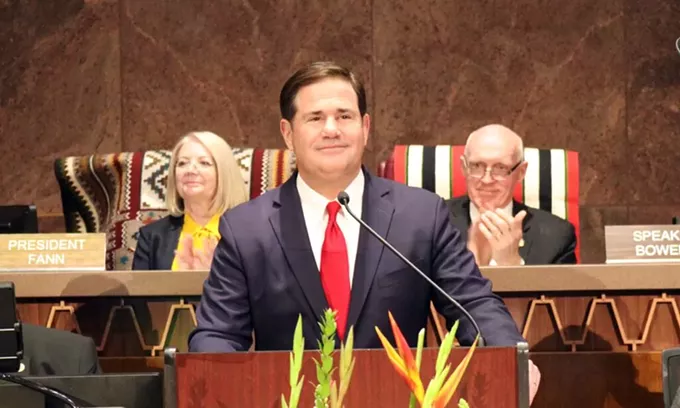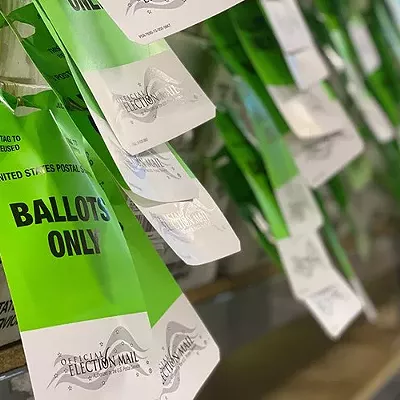Monday, March 7, 2022
Still No Evidence of Governor’s Claim that Victims Are Being Billed for Rape Kits
Gov. Doug Ducey’s claim that facilities in some Arizona counties are charging victims to process their rape kits is disputed by almost every county, and those advancing the claim refuse to reveal where it’s happening.
On Jan. 11, Ducey announced that some Arizona jurisdictions were charging victims $800 in processing fees in violation of the federal Violence Against Women Act, which guarantees that rape kits are free of cost for sexual assault victims.
Arizona law directs counties in which the assaults occur to cover the costs. The Arizona Mirror contacted all 15 county attorney’s offices in the state, and of the 14 that responded, all said they’d never heard of rape victims being charged fees in their counties. The county attorney for Apache County could not be reached after several requests for comment.
Brian McIntyre, the county attorney for Cochise County, said there was one incident 10 years ago — before he was in office — when a woman was billed for her rape kit at a local hospital emergency room. The matter was resolved by county officials after she notified them that her bill had been sent to collections.
“To my knowledge, that hasn’t happened since,” he said..
Mohave County Attorney Matt Smith said he once heard a rumor that hospitals were using collection agencies to go after victims for forensic exam fees. But in the past 10-15 years, that hasn’t been something he’s been aware of happening in Mohave.
Ducey’s claim appears to have originated with a September 2021 letter sent to the governor’s office from the Comission to Prevent Violence Against Women, which helps develop public policy. The $800 estimate was not included in the letter and interviews with the letter’s authors to find out which jurisdictions the governor was referring to were inconclusive.
After the governor made the allegation in his State of the State address, the Arizona Mirror contacted all 29 facilities in the state that provide forensic exams to rape victims. The 17 that responded to inquiries denied charging victims any fees.
A new letter from the commission and victim advocacy groups sent to the governor’s office in February repeats the claim that “several Arizona jurisdictions” are charging victims consultation fees for medical forensic exams, commonly called rape kits, but refuses to name the jurisdictions.
“We do not wish to highlight the facilities and/or counties where the no-charge policy is not being observed. There may be misunderstandings about who pays or how a bill is paid…We also believe that disclosure will potentially damage the vital relationship between providers, facilities and county attorneys,” reads the emailed letter.
Trevor Umphress, executive director of the Arizona Child & Family Advocacy Network, signed the second letter, but would not reveal county names to the Arizona Mirror, saying he was following the governor’s stance not to spotlight negative activity when so many facilities are conducting exams correctly.
“(We) don’t want to harm our relationships with the county attorneys and with our other team members and make them look negative when it’s only a few entities that are choosing to do these charges for victims,” he said.
When asked how the problem could be resolved without identifying which facilities are unfairly charging victims, Umphress said legislative language would rectify the situation by unequivocally banning such practices.
Umphress did say that charging victims was an established practice in three counties and that it has been occurring for several years. Providers are getting around federal law by referring to the service as a “consultation” and not a forensic exam.
“It’s a standard practice within these communities to charge the victims and to also charge the county attorney’s office,” he said.
In an email, Navajo County Attorney Brad Carlyon said he’s unaware of any provider in the county who has been charging consultation fees for rape kits. Occasionally, emergency rooms administer rape kits, and those are also paid for by his office. Only rape kit costs are covered, however, and not any other care.
“There are rare occasions, mainly with victims examined in an ER, where the hospital will send a bill to the Navajo County Attorney’s Office for all of the medical procedures that were performed on the victim and for medications they were given. In those rare cases, the Navajo County Attorney’s Office only pays the portion of the bill related to the rape kit,” he wrote.
Currently, only the evidence collection part of a sexual assault exam is covered under statute and paid for by county attorneys. Health care that is needed because of injuries sustained in the assault is left up to the victim’s insurance, if they have it. Bills that might end up coming out of the victim’s pocket can include sexually transmitted infection tests, casts for broken bones, stitches and ER intake exams to make sure they’re physically stable.
The Arizona Coalition to End Sexual and Domestic Violence, one of the state’s top victim advocacy groups, has been approached by sexual assault survivors about related healthcare costs, and not about rape kit “consultation” fees.
“The real culprit in charging is for the surrounding medical care; it’s not for the kit itself. And that medical care is necessary, and survivors should not be bearing the cost for paying that care when they themselves are the victim of a crime,” said CEO Jenna Panas.
Umphress, who is part of a stakeholder group that drafted legislation intended to solve the issue of “consultation fees,” said there are ongoing talks with the governor’s office to address the hospital fees that the coalition is concerned about.
Senate Bill 1593 requires counties to post the name of the official responsible for rape kit fees on their websites, and prohibits health care institutions from charging consultation fees or billing additional costs to the victim for forensic exams. The bill was approved by the full Senate on Feb. 24 and was sent to the House for consideration. Shortly after, the Twitter account for the governor’s office lauded the action, noting the measure was a priority for Ducey.
Panas said that while SB1593 doesn’t solve the issues her organization is focused on, there is value in defining more clearly who is responsible for the cost.
“Rape kits are something that we want everyone to have access to but if a payer isn’t defined then everyone plays hot potato and then the funds aren’t available. In order to keep the promise we’ve made as a state that all rape kits are free, we need to make sure that there is somebody that is responsible and who can be held accountable, so for us that’s valuable,” she said.
The coalition reached out to the governor’s office after learning about SB1593 to provide feedback for the legislation it sees as falling short of addressing the problem’s full scope. The group hasn’t been told in which counties the consultation fees are being charged. Panas noted that if the governor’s office or advocacy centers like Umphress’ have information on rape kits being charged, it’s not something the coalition can comment on.
“It feels very much like the boogeyman that’s invisible and there’s not really specificity around it. But it is not something that survivors have called the helpline or have shared. In our role as the kind of state advocacy position, I would think someone would have come forward and let us know,” Panas said.
This article was originally published by the Arizona Mirror, a nonprofit news organization.













